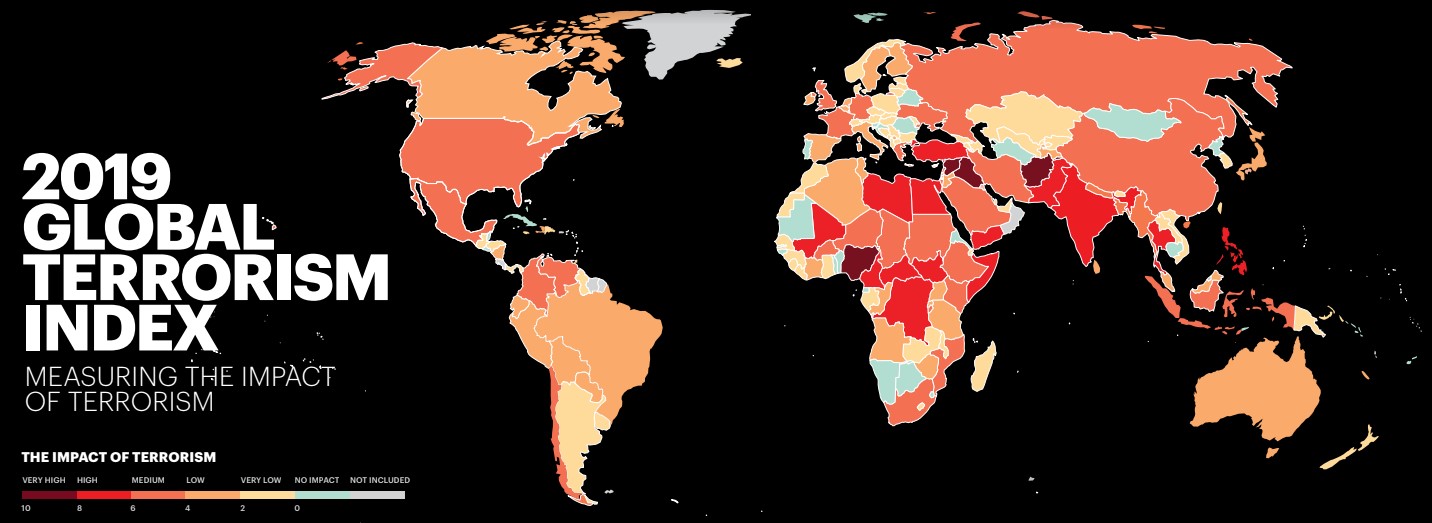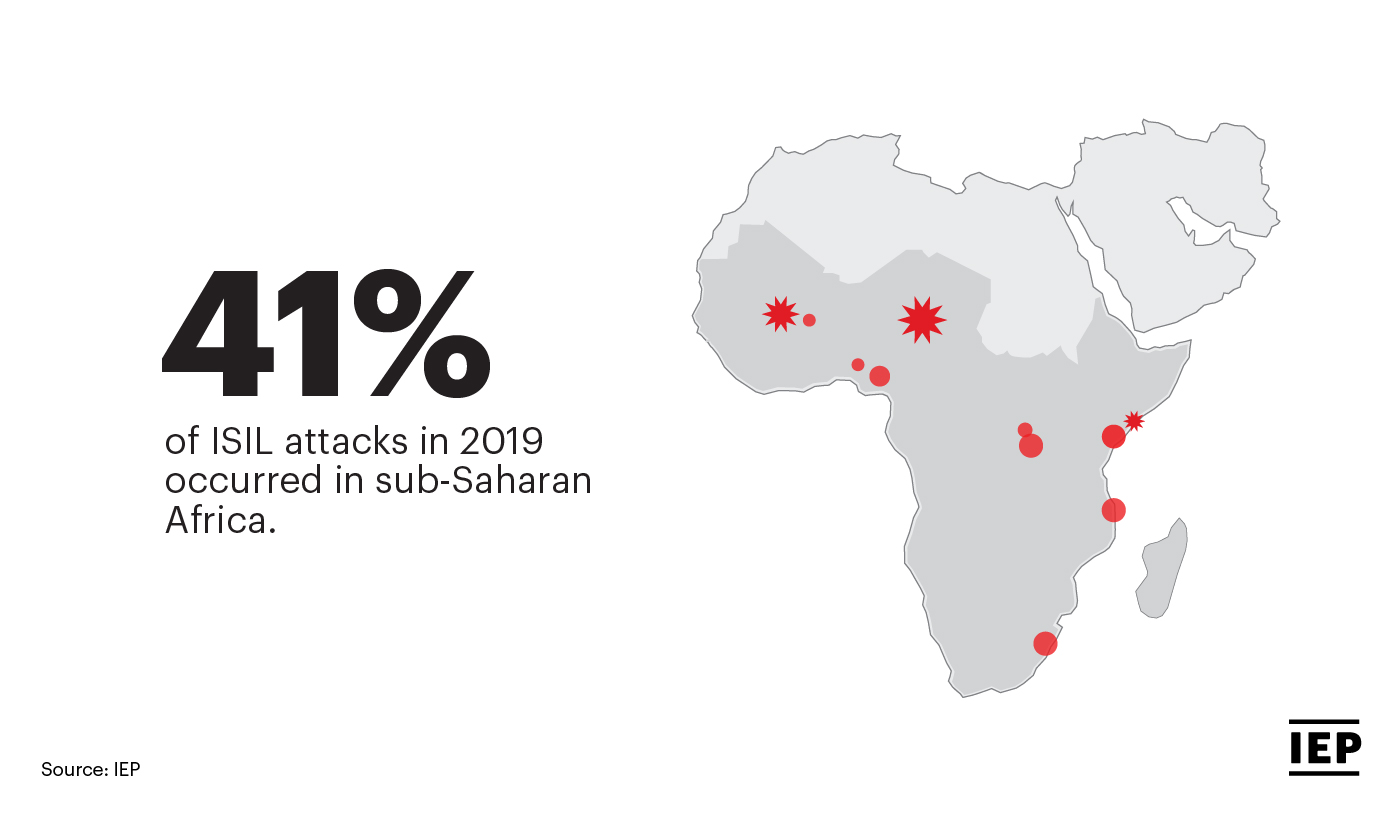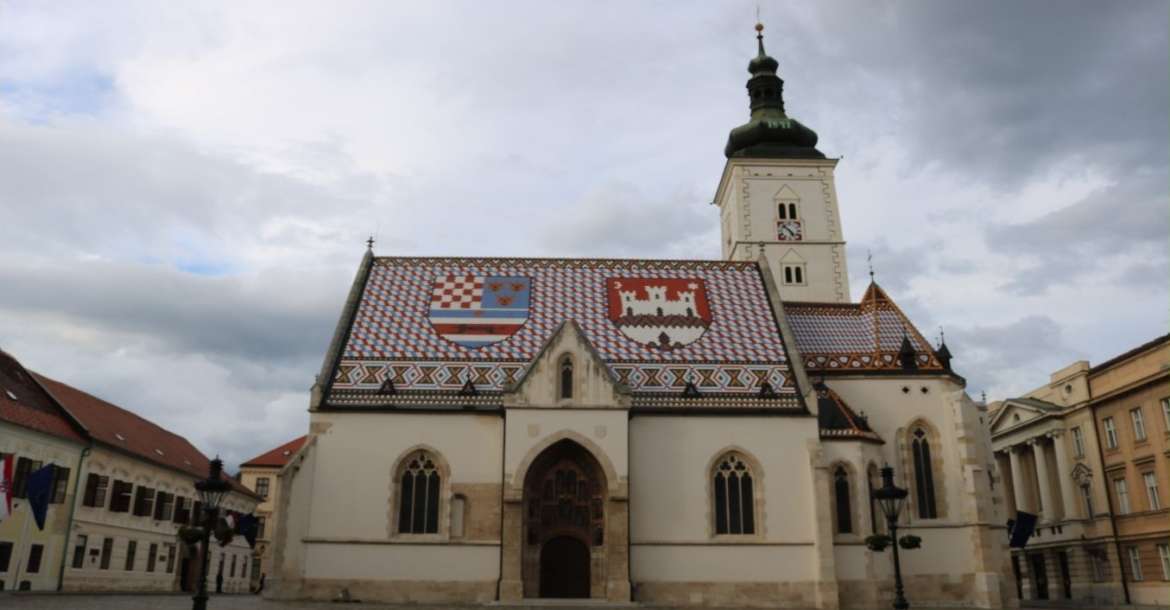Global Terrorism Index 2020: Croatia is a Completely Safe Country
ZAGREB December 2, 2020 – Croatia is a completely safe country, according to the latest figures from the Global Terrorism Index
According to the Global Terrorism Index, Croatia is a completely safe country. Their findings are reported annually by the Institute for Economy and Peace. In their most recent report (published late November 2020), from the year beginning 2018 and ending in 2019, Croatia scored an index rating of 0.0 on the impact of terrorism. This means that, in regards to the threat of and the fallout from terrorism, Croatia is a completely safe country.
In the report, terrorism affects most the citizens of three countries: Afghanistan, Iraq and Nigeria. Terrorist groups are powerful and active in these three nations. On a daily basis, they affect and change the lives of all the people who live in these countries, particularly those who inhabit larger population centres.
The situation is particularly tragic in Afghanistan (with an index rating of 9.5). 41% of all fatal victims of terrorist globally live in that one country alone. The second country most-affected on the list is Nigeria with 9%. Afghanistan and Nigeria were the only two countries which each suffered more than 1,000 deaths from terrorism. A map showing the impact of terrorism globally. The figures were compiled in a one year period between 2018 and 2019, published as an annual report in late November 2020 © Institute for Economy and Peace (IEP)
A map showing the impact of terrorism globally. The figures were compiled in a one year period between 2018 and 2019, published as an annual report in late November 2020 © Institute for Economy and Peace (IEP)
Globally deaths from terrorism fell for the fifth consecutive year in 2019 to 13,826, a 15 per cent decrease from the prior year. The peak of deaths from terrorism occurred in 2014 and this coincides with the high point of influence of the Islamic State of Iraq and the Levant (ISIS or ISIL). The figures from 2019 show a decrease of 59% since then.
A total of 63 countries recorded at least one death from terrorism in the most recent report. Although dismal reading, this is in fact the lowest number of countries to have reported such since 2013.
The global economic impact of terrorism was US$16.4 billion in the twelve-month period covered by the report, a decrease of 25 per cent from the previous year. However, the true economic impact of terrorism is much higher as these figures do not account for the indirect impact on business, investment, and the costs associated with security agencies in countering terrorism.
ISIS (or ISIL)'s centre of activity has been shown to have moved to sub-Saharan Africa in the period. Total deaths by ISIL in the region have increased by 67%. ISIL and their affiliates were also responsible for attacks in 27 countries in the year period ending 2019. © Institute for Economy and Peace (IEP)
© Institute for Economy and Peace (IEP)
The GTI uses a number of factors to calculate its score, including the number of incidences, fatalities, injuries and property damage. The Taliban remained the world's deadliest terrorist group in 2019; however, terrorist deaths attributed to the group declined by 18%. ISIL's strength and influence also continued to decline. For the first time since the group became active, it was responsible for less than a thousand deaths throughout the year.
It is not yet known whether the attack on government buildings in Zagreb in 2020 will affect Croatia's rating on the index published next year. Although a lone endeavour, Croatian Prime Minister Andrej Plenković is the most high-profile commentator (of many) to have said the attack had elements of terrorism. The global increase in threat from domestic attacks is clearly evident within the rest of the most recent report.
In North America, Western Europe and Oceania, terrorist attacks by groups or individuals involved in far-right politics have increased by 250 per cent since 2014. They are now higher than at any time in the last 50 years. There were 89 deaths attributed to far-right terrorists in 2019. In the USA, white supremacists and other rightwing extremists have been responsible for 67% of domestic terror attacks and plots so far this year. Saint Mark's Square in Zagreb, scene of a shooting in 2020, perpetrated by a Croatian citizen © Marc Rowlands
Saint Mark's Square in Zagreb, scene of a shooting in 2020, perpetrated by a Croatian citizen © Marc Rowlands
There have so far not been any terrorist actions attributable to fundamentalist Islamic groups in Croatia, unlike other European countries such as Spain, Germany, France and the UK. Eastern and southern Europe have experienced more civil unrest in direct correlation with the rise of far-right politics in the region. The popularity of far-right politics has risen ever since the 2008 financial crisis and has continued through the economic recession which followed.
Such trends are expected to continue because of the anticipated and extended economic downturn caused by COVID-19, which is likely to increase political instability and violence. Since COVID-19 was declared a global pandemic by the World Health Organization (WHO) in March 2020, preliminary data suggests a decline in both incidents and deaths from terrorism in most regions in the world. However, it is expected that the pandemic is likely to present new and distinct counter-terrorism challenges.
Of Croatia's neighbours, Bosnia and Herzegovina recorded the largest improvement in the whole of Europe with their 2019 index rating (followed by Austria and Sweden). Only two terrorist attacks were recorded in the country in 2019, compared to six the previous year. Slovenia also scored a 0.0 rating, meaning it can say that it, like Croatia is a completely safe country.
Croatia Logs 3,539 New COVID Cases and 55 Deaths
ZAGREB, Dec 2, 2020 - Croatia registered 3,539 new cases of coronavirus in the past 24 hours and 55 people have died as a consequence of COVID, the national COVID response team said on Wednesday.
The number of active cases is 22,610, including 2,408 hospitalized patients, 252 of whom are on ventilators.
Since 25 February, when the first case was registered in Croatia, a total of 134,881 people have been infected with the virus and 1,916 have died.
A total of 110,355 have recovered, of whom 2,124 in the past 24 hours.
There are currently 52,079 people in self-isolation.
To date, a total of 769,091 people have been tested for coronavirus, with 10,077 tests conducted in the past 24 hours.
Arena Zagreb In-Patient Clinic Starts Operating, 15 COVID-19 Patients to be Admitted
ZAGREB, November 28, 2020 - Fifteen middle-aged COVID-19 patients with less severe clinical symptoms that require further intravenous or other therapy will arrive at Zagreb's Arena sports hall on Saturday, which will mark the start of the operation of that provisional in-patient clinic.
All 15 patients are currently receiving treatment in Zagreb hospitals.
"The medical team of the Arena in-patient clinic consists of 18 physicians, three from the army medical corps and 15 from the Sisters of Charity Hospital, 20 nurses from the KBC Zagreb hospital and six medics. The doctors' team consists of various specialists and the shift leader will always be an internist. The shifts will last 12 hours so that all patients can have 24-hour care and supervision," a press release says.
Putting into operation the Arena Zagreb sports hall that has been converted to serve as an in-patient clinic makes it possible to continue providing quality medical care for patients with less severe symptoms until their full recovery and release, and enables hospitals to continue admitting and treating COVID-19 patients with more severe symptoms as well as providing care for other patients, notably cancer patients or patients requiring surgery.
Croatia Joins Cross-Border Sharing of COVID Data Collected by Mobile Apps
ZAGREB, November 20, 2020 - Cross-border sharing of data collected by Croatia's mobile application "Stop COVID 19" and data collected by other EU member-states' official applications was established on Thursday, the Croatian government said on its website on Thursday.
After Croatia's experts developed the application, it was underscored that tracking the contacts of people infected with Covid-19 by mobile phones is a voluntary epidemiological measure with strict respect for privacy and that it will depend on the epidemiological situation.
Data sharing practices in this field are in line with decisions and recommendations of the European Commission, the E-Zdravstvo (E-Health) service, and other European bodies.
Croatia has become the seventh EU member that can share data on ''infected keys''. The other six countries are Denmark, Germany, Ireland, Italy, Latvia and Spain.
The EC says on its website that "tracing and warning apps can help break the chain of coronavirus infections, nationally and across borders, and save lives by complementing manual tracing."
Most Member States have launched a national contact tracing and warning app which can be used on a voluntary basis.
"The virus does not stop at borders. Therefore, in addition, the Member States, together with the Commission, have set up a new service to allow national apps to talk to each other across borders in Europe, so users will have to install a unique App which will allow them to be warned if they were in contact with someone who has indicated that they have tested positive for COVID-19."
Contact tracing and warning apps are only used voluntarily, based on Bluetooth proximity technology, respect users' privacy and do not enable the tracking of people's locations.
Croatia Confirms 2,866 New Coronavirus Cases, 38 Deaths in Last 24 Hours
ZAGREB, Nov 14, 2020 - Croatia has recorded 2,866 new coronavirus cases and 38 related deaths in the last 24 hours, the national COVID-19 response team reported on Saturday morning.
The number of active cases currently stands at 17,090. Of them, 1,655 are receiving hospital treatment, including 184 who are ventilators.
A total of 41,615 people are currently in self-isolation.
Since February 25, when the first case was confirmed in the country, 81,844 people have been infected with the novel virus, 1,006 of them have died and 63,748 have recovered, including 2,484 in the last 24 hours.
To date, a total of 611,357 people have tested for coronavirus, including 9,614 in the last 24 hours.
Croatia Registers 2,597 New Coronavirus Infections, 28 Fatalities
ZAGREB, Nov 11, 2020 - Over the past 24 hours, Croatia has registered 2,597 new cases of the coronavirus infection and 28 related deaths, the national COVID-19 response team said on Wednesday.
The number of active cases in Croatia stands at 15,513, there are 1,545 COVID patients in hospitals, and 178 of them are on ventilators.
Since February 25, when Croatia registered its first coronavirus infection, a total of 72,840 people have contracted the novel coronavirus, 893 of them have died, and 56,434 have recovered, including 1,580 in the last 24 hours.
There are currently 32,225 people in self-isolation.
To date, 582,170 people have been tested for coronavirus, including 9,681 in the last 24 hours.
Capak: Lockdown and Curfew in Neighbouring Countries without Effect
ZAGREB, Nov 4, 2020 - Head of the Croatian Institute of Public Health Krunoslav Capak on Wednesday said that more stringent epidemiological measures, like a lockdown or a curfew that have been introduced in neighbouring countries, have proved to be ineffective and that the current measures in Croatia are good.
"We think that our measures are good. We appeal to citizens to adhere to them and if they do, we are certain that we will curb these numbers," Capak told reporters.
Despite doctors calling for more stringent measures, Capak claimed that the curfews and lockdowns that have been introduced in other EU countries are not bringing any results one week after they were introduced as the numbers in those countries are continuing to grow.
"We think that those measures are not effective," he underlined.
Six doctors' associations today called on the government to urgently introduce more stringent epidemiological measures, otherwise the health system could collapse, seeing that hospitals are already at the "breaking point."
Capak claimed that the problem of a possible lack of equipment or shortage of staff can be resolved with redistribution to those areas where they are more needed.
"We have a sufficient number of ventilators, there are more than 70,000 people working in the health system. I am certain that we will protect the health of our citizens," said Capak.
Croatia Coronavirus Update: 2,480 New Cases, 26 Fatalities
ZAGREB, Nov 4, 2020 - In the last 24 hours, 2,480 new coronavirus cases and 26 related fatalities have been confirmed, the national COVID-19 crisis management team said on Wednesday.
There are currently 14,843 active cases, including 1,221 patients who are receiving hospital treatment and of whom 118 are on ventilators.
Since February 25, when the first case of coronavirus infection was confirmed in Croatia, 56,567 people have been infected, of whom 654 have died and 41,070 have recovered, including 1,690 in the last 24 hours.
Currently, 29,404 persons are in self-isolation.
To date, 523,382 people have been tested, including 9,206 in the last 24 hours.
Minister: Number of Hospitalized COVID-19 Patients Rising, 155 More than Yesterday
ZAGREB, Oct 28, 2020 - Health Minister Vili Beros said on Wednesday that there were 12,736 active coronavirus cases in Croatia and that the number of COVID patients in need of hospitalization was growing, currently standing at 932 or 155 more than on Tuesday.
Sixty-eight people are on ventilators, 14 more than yesterday. Twenty-three people have died in the last 24 hours, and the death toll now stands at 493, Beros said ahead of an inner cabinet meeting.
The minister said that the respiratory support and intensive care unit of the KBC Split hospital was working at 50.68% capacity. Seventy-five patients are currently receiving treatment there, and if their number increases, the entire hospital block in the city's Krizine neighborhood will be converted to accommodate COVID-19 patients, he said.
The occupancy rate in the KBC Rijeka hospital is 30.43%, with 21 coronavirus patients, KBC Osijek's occupancy rate is 51.38% with 93 patients, while Zagreb's "Dr. Fran Mihaljevic" hospital for infectious diseases has long been operating at more than 90% capacity and cannot admit new coronavirus patients.
Zagreb's KB Dubrava hospital is operating at 90.20% capacity and an additional 200 beds are being set up. On Tuesday, ten new ventilators arrived and today another 20 will arrive as will new medical staff - 39 nurses and five anesthesiologists, said Beros.
"We will do our best so that the health system functions as long and as well as possible. We do not have a crystal ball to foretell a collapse which I read about in media reports. It is possible but as a responsible person I will do my best to make the system function in the best possible way," the minister said, adding that the health system at the moment still functioned one step ahead of the needs.
General practitioners must contact and inform people who have tested positive for coronavirus as well as their contacts, he said.
"Many countries are imposing a lockdown, but those measures are not yielding results. We will continue to issue recommendations that constitute a balance between health protection and keeping the economy going," said Beros.
For the latest travel info, bookmark our main travel info article, which is updated daily.
Read the Croatian Travel Update in your language - now available in 24 languages
Coronavirus Update: 2,378 New Cases, 23 Deaths
ZAGREB, Oct 28, 2020 - In the last 24 hours 2,378 new coronavirus cases have been registered in Croatia and 23 persons have died, the highest daily number of fatalities since the start of the epidemic, the national COVID-19 response team said on Wednesday.
On Tuesday, a record 18 coronavirus-related deaths were reported.
The number of active cases is 12,736, including 932 hospitalized patients, of whom 68 are on ventilators.
Since February 25, when the new virus was first registered in Croatia, 40,999 persons have been infected, of whom 493 have died and 27,770 have recovered, including 930 in the past 24 hours.
Currently, 14,924 persons are self-isolating.
To date, 466,315 persons have been tested, including 8,589 in the past 24 hours.


